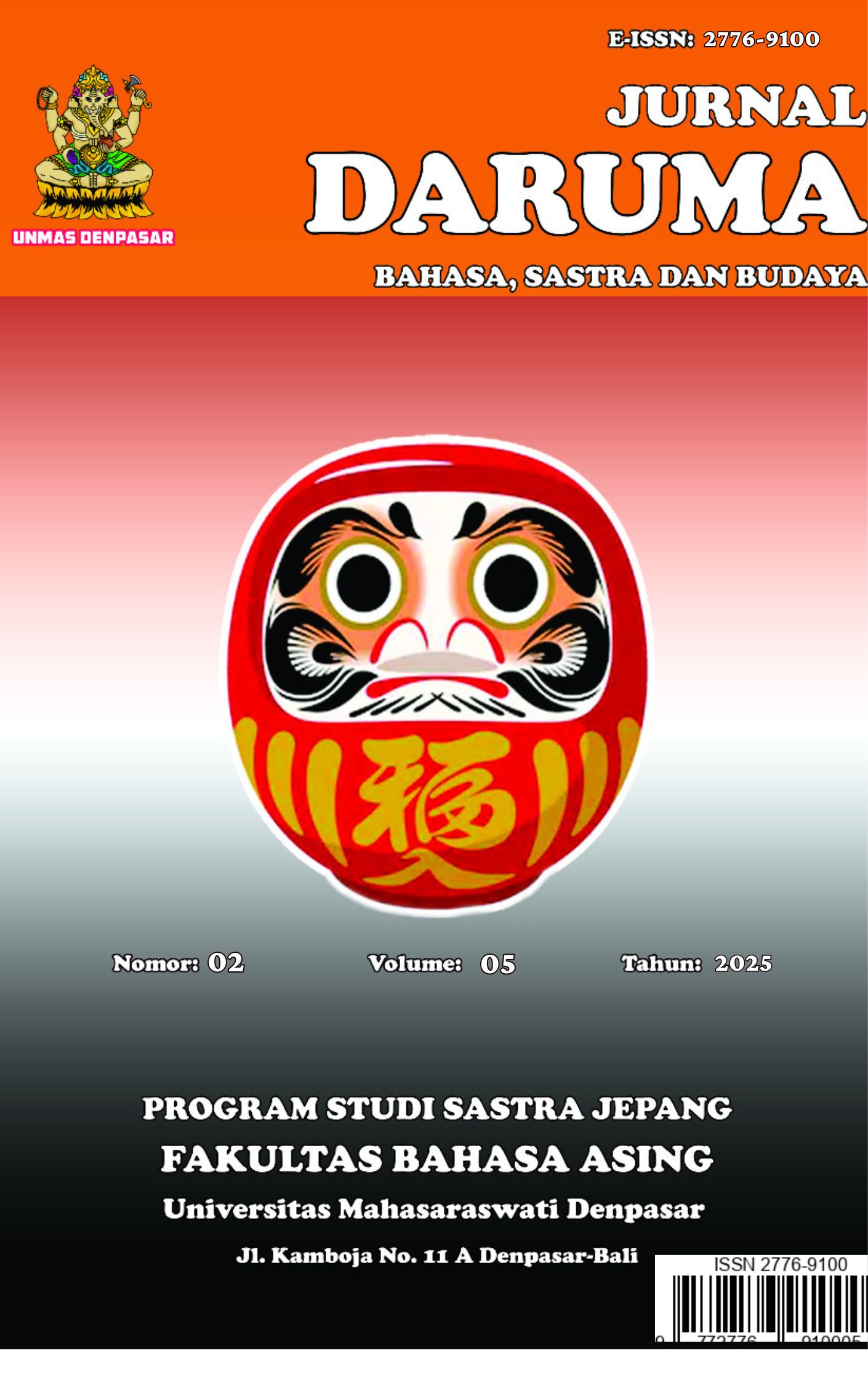MAKNA VERBA NERAU DAN MEZASU DALAM SINONIM BAHASA JEPANG
Kata Kunci:
bahasa jepang, makna, sinonim, verbaAbstrak
Bahasa Jepang merupakan salah satu bahasa asing yang mempunyai banyak variasi kata. Salah satunya adalah variasi kata dalam kelas verba. Artikel ini membahas tentang makna dan penggunaan verba ‘nerau dan mezau’ sebagai sinonim dalam bahasa Jepang. Penelitian ini memfokuskan pada kalimat-kalimat yang digunakan oleh penutur asli bahasa Jepang. Pengumpulan data dilakukan melalui metode wawancara dan teknik catat. Wawancara dilakukan secara langsung dengan penutur bahasa Jepang sambil mencatat kalimat-kalimat yang mengandung sinonim verba ‘nerau dan mezau’ dalam bahasa Jepang. Data dianalisis dengan pendekatan teori makna kontekstual (Pateda, 2010) dengan cara menganalisis makna verba ‘nerau dan mezau’. Dari data yang ditemukan, verba ‘nerau’ bermakna : mengincar posisi/status, menyerang dengan kata-kata, menginginkan beasiswa, ambisi menang dalam pemilu, mencari keuntungan besar, membidik kepala musuh, menembak dan membidik botol, memancing dan membidik ikan, serta menginginkan kenaikan gaji. Verba ‘mezasu’ bermakna : memfokuskan kepuasan pelanggan, menargetkan lulus ujian, menargetkan kenaikan pangkat, menargetkan kestabilan ekonomi, menargetkan level yang lebih tinggi, dan menargetkan pelayanan terbaik. Data tersebut menunjukkan bahwa verba ‘narau dan mezasu’ mempunyai makna dan penggunaan yang berbeda tergantung konteksnya.
Referensi
Basri, E. A. (2015). ‘Penggunaan sinonim ‘Taisetsu, Juuyou dan Daiji’. Malang: Universitas Brawijaya
Gapur, Abdul (2019). ‘Analisis Makna Polisemi Verba ‘Kiru’ (memotong) dalam kalimat Bahasa Jepang’. Medan: Universitas Sumatra Utara.
Nurila (2015). ‘Analisis Makna Verba ‘Dasu’ sebagai Polisemi dalam Bahasa Jepang’. Semarang: Universitas Negeri Semarang.
Dwi Susanti, Y. (2015). ‘Analisis penggunaan verba ‘Narau’ dan ‘Manabu’ dalam kalimat bahasa Jepang’. Manado: Universitas Sam Ratulangi
Japanese Dictionary Takoboto (offline). (2014). Electronic Dictionary Research and Development Group.
Pateda, M. (2010). Semantik Leksikal. Jakarta:Rineka Cipta.
Sentosa, N. (2016), ‘Analisis Semantik Sinonim ‘Tomodachi, Yuujin, dan Nakama’ dalam kalimat Bahasa Jepang. Riau: FKIP Universitas Riau
Sugiyono. (2016). Metode Penelitian Kuantitatif, Kualitatif dan R&D. Bandung.
Sugiyono. (2017). Metode Penelitian Kuantitatif, Kualitatif, dan R&D. Bandung.
Sutedi, D. (2003). Dasar-Dasar Linguistik Bahasa Jepang. Dasar-Dasar Linguistik Bahasa Jepang Edisi Revisi (Cetakan kelima). Humaniora, Bandung.
Yuliastuti, Astri (2011). ‘Analisis Verba ‘Ukeru’ dalam Kalimat Bahasa Jepang’. Semarang: Universitas Negeri Semarang.





